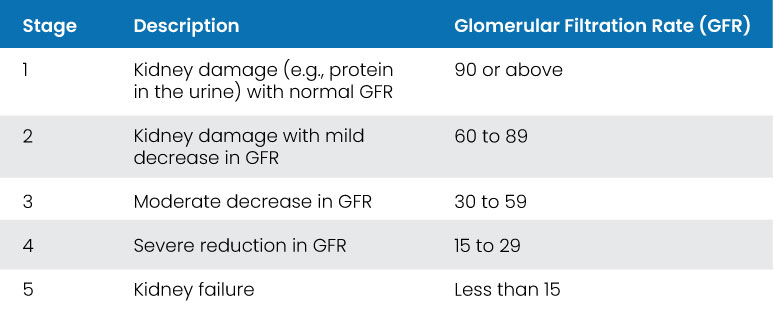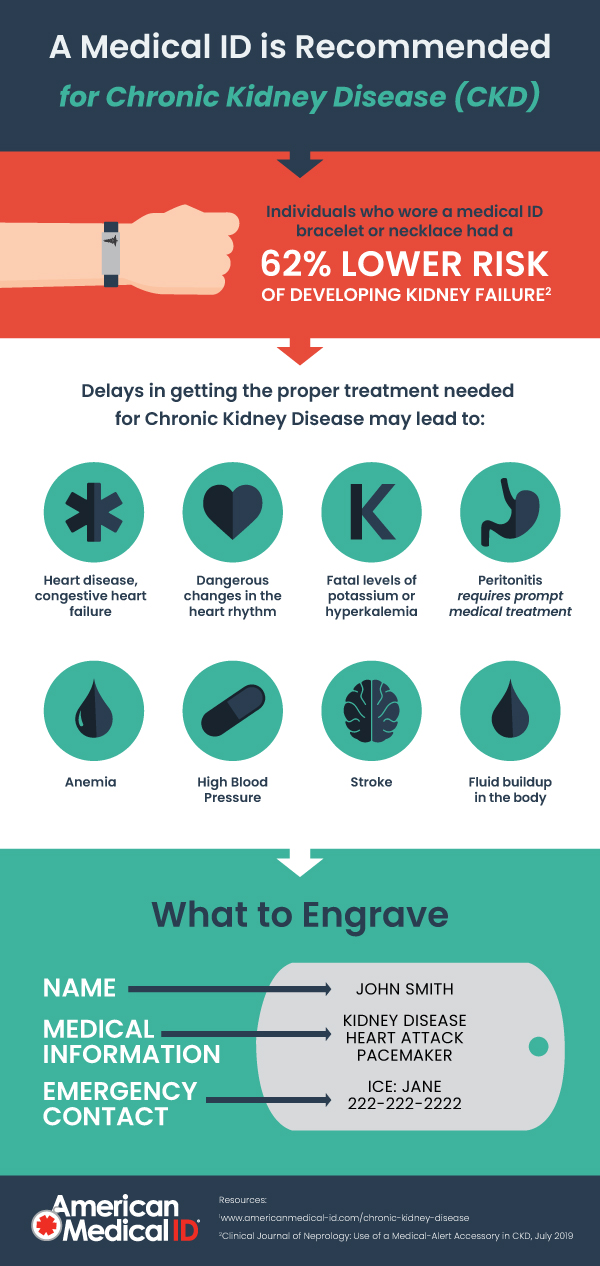

Medical Alert IDs for Chronic Kidney Disease
A medical ID is recommended for Chronic Kidney Disease. This guide is written for CKD patients and caregivers who are considering a medical ID for the first time.
Chronic kidney disease (CKD) is a medical condition characterized by a gradual loss of kidney function over time. When the kidneys are not healthy, they have a hard time removing waste from the blood and this may lead to serious complications. Having diabetes, high blood pressure, heart disease, and a family history of kidney failure are some of the main causes for having chronic kidney disease.
According to the CDC, chronic kidney disease is common among US adults. More than 1 in 7 or 15% of Americans are estimated to have chronic kidney disease. This translates to 37 million in the US being affected by CKD. According to NIH, more than 661,000 Americans have kidney failure. Of these, 468,000 individuals are on dialysis.Every day, more than 240 people on dialysis die.
Stages of Kidney Disease




Click here to view full infographic.
Chronic Kidney Disease and Kidney Failure in Emergencies
Emergencies such as natural disasters or accidents can disrupt delivery of healthcare services to a person with chronic kidney disease. Dialysis treatments for example, can be impacted by power blackouts and severe weather.
Missing dialysis could cause the toxin levels in the blood to build up rapidly which can lead to fatal outcomes. According to the NHS, missing more than one treatment in a row is always dangerous.
“You should get and wear a medical emblem. This has vital information about your medical condition and treatment, and alerts medical staff to your special needs.” – Kidney.org
In emergencies, anyone diagnosed with chronic kidney disease or kidney failure may require special medical attention and monitoring. It is important that patients are able to communicate and identify their medical condition at all times. This includes individuals who are:
- Undergoing in-center hemodialysis
- Undergoing home hemodialysis
- On Continuous Ambulatory Peritoneal Dialysis (CAPD) or Continuous Cycling Peritoneal Dialysis (CCPD)
- Transplant recipients
- Diagnosed with diabetes
Delays in getting the proper treatment needed for chronic kidney disease may lead to the following complications:
- Fatal levels of potassium or hyperkalemia. This condition can lead to dangerous, and possibly deadly, changes in the heart rhythm.
- Increased risk of peritonitis or inflammation of the membranes of the abdominal wall and organs. Peritonitis is a life-threatening emergency that needs prompt medical treatment.
- Anemia or decreased supply in red blood cells. Anemia can make a patient tired, weak, and short of breath.
- Heart disease, heart attack, congestive heart failure, and stroke
- High blood pressure which can cause further damage to the kidneys and negatively impact blood vessels, heart, and other organs in the body.
- Fluid buildup in the body that can cause problems with the heart and lungs.
“The most common cause of sudden death in patients with ESRD is hyperkalemia, which often follows missed dialysis or dietary indiscretion. The most common cause of death overall in the dialysis population is cardiovascular disease; cardiovascular mortality is 10-20 times higher in dialysis patients than in the general population.” - Medscape
Medical Alert IDs Can Help Manage CKD
Medical IDs can alert others that Chronic Kidney Disease is present because CKD is not often apparent to first responders. A medical ID serves as an effective tool to alert emergency staff of a patient's special care needs, even when a person can’t speak for themselves. When every second counts, wearing a medical ID can help protect the kidney and safeguard its remaining function.
Wearing a medical ID also serves as a reminder for patients to manage their health better. In a study of 350 patients, primarily in CKD stages 2 through 5, those who wore a medical ID bracelet or necklace had a 62% lower risk of developing kidney failure, based on eGFR. Wearing a medical-alert bracelet or necklace was associated with a lower risk of developing kidney failure compared with usual care.

"One of the important things I wear each day is a medical alert. ESRD is a silent disease, which means I don't show that I have a major disease affecting my life. My medical alert helps to communicate that here is more to my medical problems than what they would see in a quick emergency check." - Katherine Soto
What To Put On A Medical ID For Chronic Kidney Disease Or Kidney Failure
To effectively alert health care providers to consider a patient's chronic kidney disease, a medical ID should have accurate and easy to read information engraved. However, some people find it difficult to decide what needs to be on an emblem.


Different types and stages of kidney disease are often managed by specialized treatments and medications. A custom engraved medical alert jewelry can hold precise information that is specific to the wearer's health condition. Here are some of the most important items to put on a chronic kidney disease or kidney failure medical ID:
- Name
- Medical information - including if you have other medical conditions such as diabetes or high blood pressure
- Stage of CKD or kidney function
- Transplant information
- Contact person
Common Abbreviations Used In Chronic Kidney Disease:
|
APD - Automated Peritoneal Dialysis ATG - Anti-Thymocyte Globulin BP - Blood Pressure CAPD - Continuous Ambulatory Peritoneal Dialysis CCPD - Continuous Cycling Peritoneal Dialysis ECG - Electrocardiogram ECHO - Echocardiogram |
eGFR - Estimated Glomerular Filtration Rate ESRF - End-Stage Renal Failure ESRD - End-Stage Renal Disease ERF - Established Renal Failure OKT3 - Orthoclone K T-cell Receptor 3 antibody PCKD - Polycystic Kidney Disease PD - Peritoneal Dialysis PTH - Parathyroid Hormone |
There are many styles of medical IDs, some with larger medical ID plates where more information can be engraved. We invite you to look at our medical IDs for your personal use. If you’re unsure of what to engrave, get advice from a medical professional on the most critical information that should be included. An emergency wallet card can also supplement information found on a medical ID for kidney disease such as your current list of medicines. Read more tips on choosing a medical ID here.
Your medical information can help save your life in an emergency. If you’re unable to get a medical alert ID at this time, make use of emergency ID apps on your phone to serve as a temporary back-up.


"I clearly remember being given Sulphur drugs in the Emergency Room when I was by myself and unable to let the medical staff there know I have Chronic Kidney Disease. I also remember that my husband fell when I was out of town. His grown children took him to the emergency room but didn’t know about his latex allergy and he was in no condition to explain. If we had been wearing medical IDs, these would not have happened.” - Gail Rae-Garwood

 - UK
- UK  - Canada
- Canada  - Australia
- Australia 
